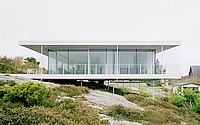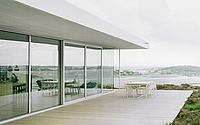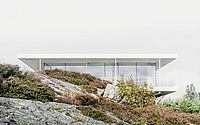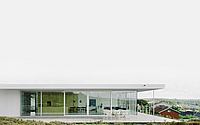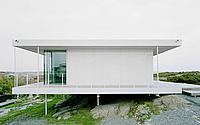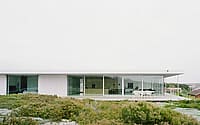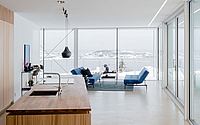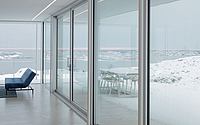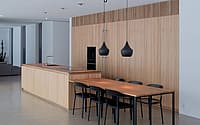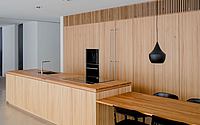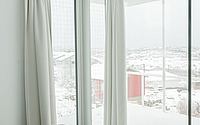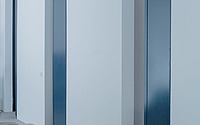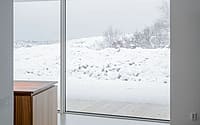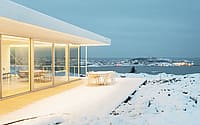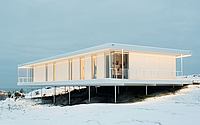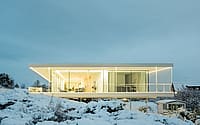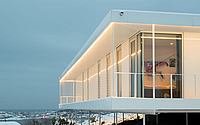Plastic House II by Unit Arkitektur AB
Plastic House II is a modern prefab house located in Torslanda, Sweden, designed in 2017 by Unit Arkitektur AB.









Description
West of Gothenburg lies Sweden’s fourth biggest island – Hisingen. Traveling from the center of Gothenburg towards the western side of Hisingen, you first pass Volvos industrial production units before reaching the coast and the ferry terminal which connects Hisingen to the northern archipelago.
Just north of Hjulvik´s ferry terminal, a shift in the landscape occurs – from Hisingens plains (former seafloor) to Bohusläns coastal landscape with its ancient and sweeping outcrops of gneiss and granite. The last kilometer to the site winds and rises before finally you are rewarded with a great view back towards the ferry terminal. This area is called Hästevik.
The clients for Plastic house II are the same as for our first built house ten years before – Plastic house I. They have now bought this real estate, some kilometers from the old house, and wanted to complement the existing summer house with a new single-story house. The family has three kids.
Hästevik has, like many areas, been transformed from having mostly summer houses to becoming a permanent residential area. Building permits have been handed out liberally and small houses have been replaced with bigger ones. The effects on nature have been so considerable that almost no trace of the original coastal character is left. Basements have been sunken into the mountains, crevices and valleys leveled and fundaments introduced, creating terraces and lawns. The sweeping lines and the exposed mountains natural to the West coast have been blown away, bit by bit.
For us, two things were fundamental during the design process of Plastic house II. First to maximize the fantastic view and second to minimize the impact on nature.
We can basically disassemble the house and the only thing left would be the 19 holes drilled in the mountain for the pillars. To reduce the footprint further the drains have been placed above ground and covered with a layer of earth.
We strove to keep the design simple and at the same time retain a luxurious feel as in the Case Study Houses built in the early fifties in California. A kind of glamour camping. A simplicity and comprehensibility in the built structure but with generous living qualities. At the same time, we tried to build in dissonances both in the material palette and the actual geometric composition, to avoid too much of classic modernism.
The floor plan is simple – private areas facing east and the public area, with direct access to the adjacent granite rocks, facing west. The division between the two parts lies at the center of the house, along the longitudinal axis. The public area with kitchen and living room can be separated from the kid’s living area by means of a sliding door.
The house is supported by 19 circular 80 mm columns. Each column is placed in a drilled hole (300 mm deep) and has been fixed with an expanding plaster. The locations and the heights of the columns have been measured on-site to enable prefabrication before the galvanization. The columns support three HEA 200 beams that support the whole house. All steelwork is galvanized and powder-coated in white. The complete steel construction was carried out in two weeks. On top of the steel, a prefabricated wooden frame was mounted in less than three weeks.
The underside of the house has been covered with white perforated corrugated aluminum. Due to the exposed position, all other metalwork consists of coated aluminum. The windows have been built with Schüchos system. The facade is a development of the system we created for Plastic house I. A façade with 5 mm opak PMMA is taped with velcro acrylic foam tape mounted on standing sheet metal studs, to avoid exposed fixings and to handle the thermal expansion. The sheets can then easily be demounted if need of replacement.
Photography by Per Nadén
Visit Unit Arkitektur AB
- by Matt Watts